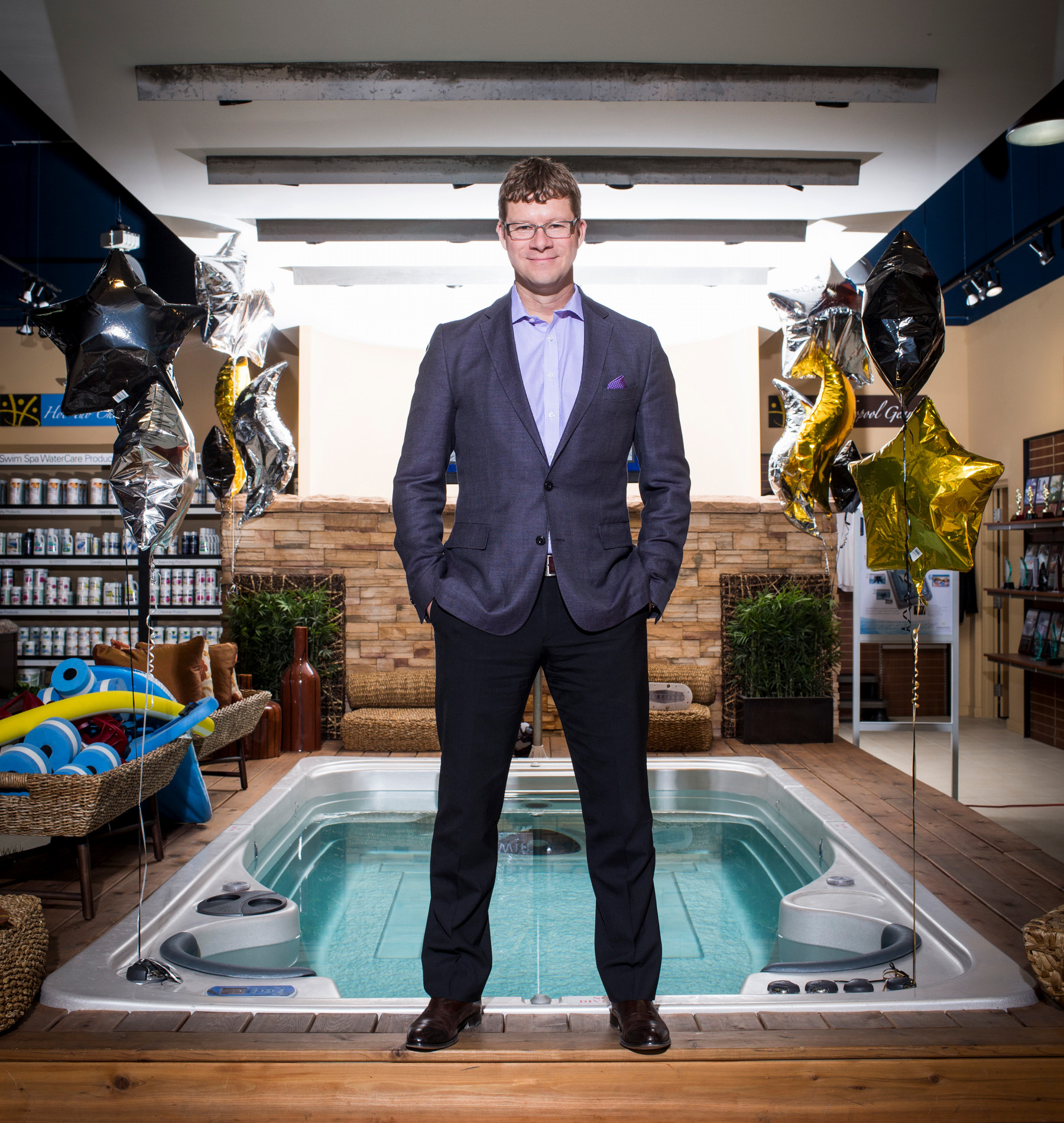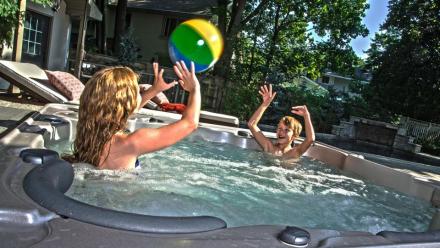In and Out of Hot Water

In the late 1980s, a house on Earl Street in the Queen’s ghetto was known to hundreds of students as Stonehenge. Dave Jackson, BCom’91, and four housemates chose the name in homage to a favourite scene in the hilarious mockumentary This is Spinal Tap. If you haven’t seen it, picture a past-its-prime rock band on stage, a prop unveiling gone horribly wrong, dwarfish Druids trampling a miniature replica of Stonehenge and you get the gist (it’s worth Googling).
For Dave and his housemates, Stonehenge on Earl really was a magical place. “I lived with the same four housemates from second to fourth year,” Dave recalls of his cohabitation with Paul Pellizzari, BCom’91, Christopher Smith, BSc(Eng)’91, Edward Iacobucci, BA(Economics)’91, and Burke Paterson, BA(Fine Arts)’92, all of whom remain very close friends to this day. “We were all really involved in campus life as orientation leaders. I was Chief Boss and we had two Gaels, another Boss and a FREC (Frosh Regulation Enforcement Committee member). I was also involved in ComSoc; worked on I.C.B.C., eventually as Chair; and was into extracurricular sports. With all that we were involved in, hundreds of students came through the house during our three years there.”
Sadly, there will be no visit to 223 Earl Street when Dave, his housemates and BCom’91 classmates return to Queen’s for their 25th anniversary reunion in October. “It was condemned when we lived there,” Dave laughs. “It was torn down not long afterwards. But the name Stonehenge lived on, even after we moved out.”

Setting off to their formal from Stonehenge in 1991 are Paul Pellizzari, Burke Paterson and Dave Jackson.
Dave knew long before graduation that his ultimate career ambition was to own his own business. He’d run a successful College Pro Painting franchise in the summers after first and second years and felt ready to launch his own enterprise as soon as the ink dried on his Commerce degree. His father, a corporate executive in the steel industry, advised otherwise. “He told me, ‘You’re not half as smart as you think you are. You should go and work for someone else first’, ” Dave recalls.
Heeding his father’s advice, Dave landed a job at Procter & Gamble. “I’d heard it was a great training ground that provided such a good foundation that it was almost like doing an MBA.”
He spent three and a half years soaking up all P&G had to offer, starting on the Bounce account before moving on to the company’s largest brand, Tide, and then to Cascade as a brand manager. During the last 18 months of his tenure there, Dave starting looking for a company to acquire. “I researched many businesses on paper, and went to visit about 20 companies. Hydropool felt like the best fit,” Dave explains.
When the recession hit, sparked by the financial crisis in 2008, sales plummeted. Within three years, the global hot tub market fell 70%.
The founder of Mississauga, Ontario-based Hydropool Hot Tubs and Swim Spas, Dale Papke, had built his business from a commercial swimming-pool servicing company in the 1970s to a manufacturer of hot tubs and swim spas (swim-in-place pools) through the 1980s. By the mid-nineties, he was only working part of the time at Hydropool and was looking for a hands-on partner. Dave was very familiar with the product, having grown up enjoying the family’s hot tub at their cottage in Apsley, Ont.
“I thought it would be a growing market,” Dave explains of his decision to buy into Hydropool. Cocooning — a trend predicted by marketing guru Faith Popcorn to describe consumers’ growing preference for spending leisure time at home rather than going out — supported Dave’s instincts. “Hot tubs were a consumer product that I understood well and felt I could market and sell easily, not like some obscure software that I wouldn’t have understood.”

Dave on the plant floor with Hydropool staffer Luis Zavala.
In 1995, Dave put in an offer to buy half the company, halving his previous salary from P&G. His partner welcomed the addition of new blood and gave Dave considerable autonomy to grow the business. After learning the ropes in Mississauga, Dave introduced improvements to the sales, marketing and customer service functions, and met with customers locally and farther afield. These ranged from Mom-and-Pop operations to large-scale retailers, as well as hotel and condominium developers.
His first overseas trip for Hydropool, at the age of 27, saw Dave firming up relationships with existing customers and attempting to sign up new ones. In Sweden, he phoned a prospect who was initially reluctant but finally agreed to a meeting. Over dinner at his home, also the location of his bathtub-retail shop, the owner and Dave hit it off. A relationship that started over a family-style Swedish meal blossomed into a business relationship that has lasted more than 20 years. “Jonas struggled initially, and we went out on a limb for him on a few occasions, but eventually his business took off,” says Dave. “Last year, he doubled his operations and his company is now our third largest customer in the world.” At their last meeting, Jonas thanked Dave for having believed in his company’s future from the start. “And I thanked him for giving us millions of dollars of business, and for helping to make us one of the leading hot tub brands sold in Sweden today.”
Inroads into new markets, across Canada, and in the U.S. and Europe, and the addition of new product lines fuelled the company’s growth. “We were one of the first companies to sell hot tubs in Europe, where a pool culture in France and the often cold and wet climate in the U.K. offered great opportunities,” Dave explains.
Business grew at 50% a year for the first eight years after Dave’s arrival, and its employee base increased from 13 in 1995 to more than 200 by 2008. Times were good, luxury products were selling well, and health and wellness factors were helping boost the popularity of swim spas and hot tubs. Then the recession hit, sparked by the financial crisis in 2008, and sales plummeted. Within three years, the global hot tub market fell 70%. “Hydropool ‘only’ fell 30%,” says Dave, “although we doubled market share, it was enough of a drop that drastic measures were needed.”
“It was the perfect storm of a global recession, an at-par Canadian dollar and high oil prices, therefore high input costs,” Dave explains. “We had 270 employees and we had to cut 90 people in a six-month period.” Hydropool had attracted a loyal workforce, including many longtime employees. Laying off so many good people was a wrenching prospect. Dave credits one of his board members, whose advice helped Dave take the necessary action. “He said, ‘You can’t think of it as cutting 90 jobs. You have to think of it as saving 180 jobs. Because if you don’t cut the 90, you’ll lose everybody.’ ”
It’s been a slow and steady recovery since 2010. “We did what we had to do, and ended up with a healthy business, with a very strong and loyal team, after surviving that difficult time,” says Dave. From 2010 to 2014, the company grew by about 10% per year. That figure increased to 20% in 2015 — a record year, thanks in part to the falling loonie. Since October 2015, there have been 60 new employees brought on to keep pace with the growth. Now the company employs 300-plus people around the world, including 200 in Mississauga, 85 in France and 30 in the U.K. The French and British companies had been longstanding customers that Hydropool acquired, making the company the largest supplier of hot tubs to France and one of the largest to the U.K.
Key to Hydropool’s success has been maintaining strong relationships with nearly 400 customers in 45 countries around the globe, from Tahiti to Iceland, with the majority in North America and Europe. The company has a vested interest in ensuring that retailers have in-depth knowledge of its product line. That’s why the showpiece of the Mississauga facility is a 60-seat theatre used for training employees of customers from around the world. The company also hosts regional and annual conferences that bring together large numbers of these employees and customers’ management teams.
While most of the business travel falls to the company’s VPs, Dave visits Europe about four times a year. He combines calls on customers in multiple locations with the hosting of the firm’s annual conferences. Last year’s event brought 100 customers to Budapest (a visit to the Turkish baths there was a highlight, says Dave). “The common bond is that we’re all entrepreneurs and owners of small businesses, and we’re all trying to help each other succeed,” says Dave.
His most recent visit to the U.K. was a productive one, though a side trip to Stonehenge didn’t fit into Dave’s itinerary. It wouldn’t have been able to top his first visit, while backpacking through Europe the summer after his third year at Queen’s. Dave and fellow Stonehenge-on-Earl resident Chris Smith made a pilgrimage to the historic, some might say sacred, site. Seeing the giant stones in their imposing circle left a lasting impression. “I just couldn’t believe they built it so close to the highway,” he says, with a wink.

The Jackson children, Madeline and Jacob, in the family’s hot tub at home in Etobicoke.
Hydropool isn’t the only entrepreneurial venture that occupies Dave’s time these days. As one who caught the bug at an early age, he continues to exercise his own entrepreneurial chops by supporting budding start-ups. “I have 20 angel investments in companies from Switzerland to New York to Phoenix, with many in Ontario as well,” says Dave of these start-ups in such industries as robotics, sporting goods and environmental technologies. In addition to financial support, he is often active on their boards, providing mentorship and guidance from the perspective of one who’s been there.
His return to Queen’s for Homecoming in October will be a time to revisit old haunts and reconnect with old friends. This time around, his wife Carrie (a Western grad) will be joining him for the festivities, for a reason other than the football game or class events. “Our daughter Madeline will have just started her first year in Commerce,” says Dave proudly. “I’m sure that seeing her at Queen’s will feel a bit like I’ve come full circle.” ▪
